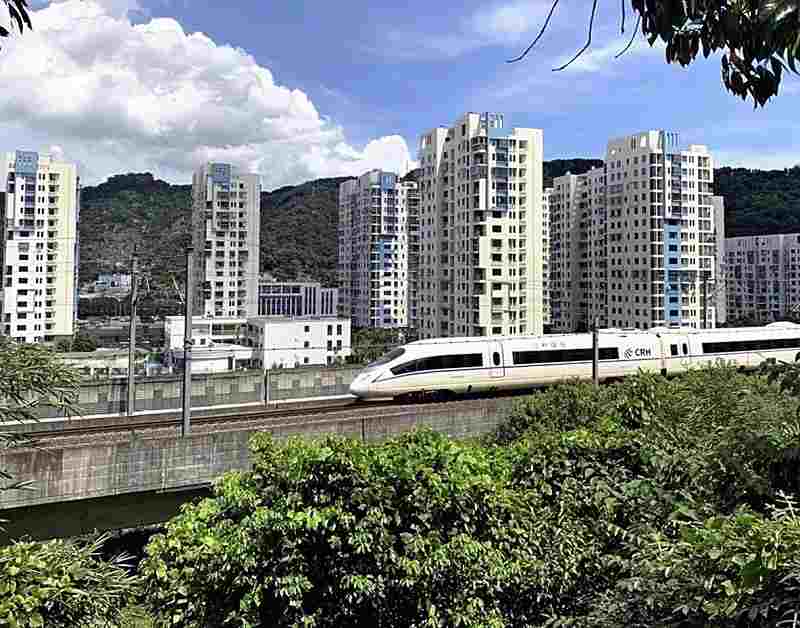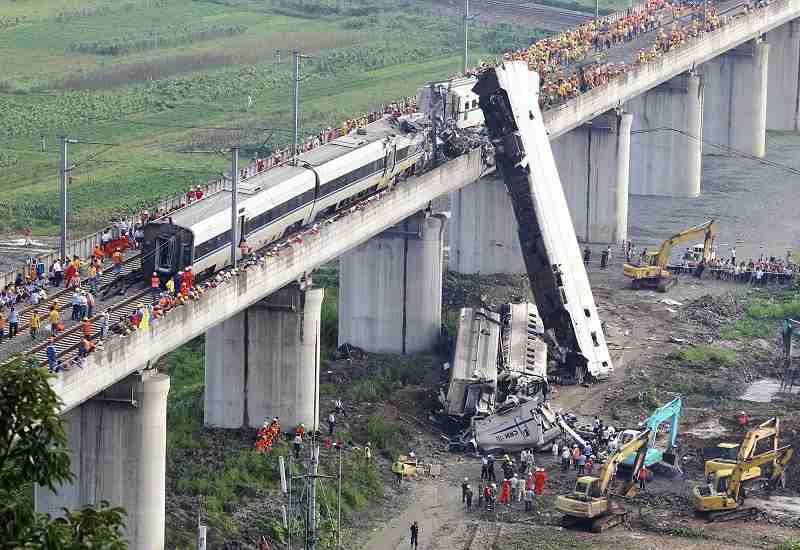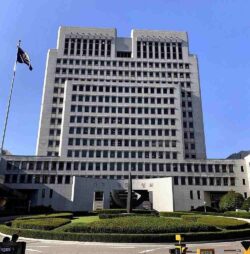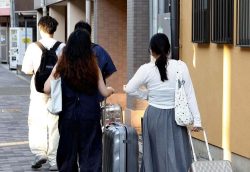
A high-speed train passes near the site of the accident in Wenzhou, Zhejiang Province, China, in mid-July, with high-rise condominiums in the background.
15:41 JST, July 24, 2021

A map of China
WENZHOU, China — Friday marked 10 years since the major high-speed rail accident that occurred in Wenzhou, Zhejiang Province, in eastern China — an accident the Chinese government rushed to cover up by controlling media reports in its immediate aftermath. A decade out, the administration of Chinese President Xi Jinping remains wary of rekindled criticism, as it continues to expand high-speed rail networks as part of a national prestige project, as if the accident had never happened.
Changed scene
On July 23, 2011, a train traveling slowly on an elevated railway in Wenzhou was hit by another train from behind. The collision derailed four cars, which plunged to the ground, leaving 40 passengers and crew dead, and 172 injured.
Criticism erupted after the authorities destroyed and buried the cars, then resumed operations on the line two days later. The government’s final accident report conceded that the crash was a “man-made disaster,” citing defects in the traffic signals and low safety awareness among workers.
On a visit to the accident site in mid-July, I found a shoe factory and apartment block under construction in the area. The area seemed to be unrecognizable from 10 years ago. Back then, there were no high-rises nearby.
The site where the train cars were buried was now fenced off and overgrown with weeds. At first glance, no trace remained of the accident to indicate what had transpired there. But eight authorities trailed me during the visit.
Most of the people who lived in the area at the time of the accident have since left, driven off by development. One such former resident is a 67-year-old man who helped rescue people from the derailed cars.
“The accident seems to have faded with time, but I still hear the cries for help,” he said.
Meanwhile, some newcomers to the area were evidently not aware of the accident.

A derailed high-speed train lies toppled against the ground from an elevated railway in Wenzhou in July 2011.
Messages still coming
The authorities’ haphazard response in the immediate wake of the accident enraged the families of victims, who accused the government of “disregarding human life” and “destroying evidence.”
Even the Chinese media, which typically toes the party line, carried out its own coverage of the incident and pushed bereaved families to demand an inquest into the truth.
Wary that criticism would be aimed at the government, the authorities issued a notice the day after the accident compelling media outlets to refrain from independent reporting.
Some members of the media resisted, but the regulations only grew tighter. One year later there were hardly any special features appearing on the accident.
“I can’t even touch on the accident at all [now],” said a 46-year-old Chinese journalist, who had reported from the scene at the time.
People worry about a girl who lost her parents in the accident when she was 2 years old. Her uncle said he still receives messages of concern for her on social media.
“She’s now a junior high school student. She went through hardships, but she’s growing up,” the uncle posted in early July, without mentioning the accident directly.
Another man who lost a relative has not updated his social media account since a month after the accident, but people have continued to post messages saying they will “never forget the tragedy.”
‘Example of success’
Before the accident at the end of 2010, China’s high-speed rail network had 8,358 kilometers of operational track. By the end of 2020, this had more than quadrupled to about 38,000 kilometers, making it the longest network in the world.
High-speed rail, a symbol of economic development, is being exported overseas under China’s Belt and Road Initiative with the aim of establishing an enormous economic zone.
“The high-speed rail is a successful demonstration of China’s independent innovation,” Xi said in January at a high-speed railway station he visited to inspect a venue for the Beijing Winter Olympics.
Chinese authorities seem to be trying to act as if neither the tragic accident nor the history of receiving railway technology from Japan and Germany ever existed.
"World" POPULAR ARTICLE
-

8 Japanese Nationals Stranded on Indonesia’s Sumatra Island
-

U.S. Senate Resolution Backs Japan, Condemns China’s Pressure
-

China to Impose Sanctions on Shigeru Iwasaki, Former Head of Japan’s Self-Defense Forces, Who Serves as Adviser to Taiwan’s Executive Branch
-

South Korea’s Top Court Dismisses Nippon Steel Appeal in Lawsuit over Requisitioned Worker
-

75% of Myanmar People Reject Army’s Political Involvement, According to Survey Conducted by Aid Organization
JN ACCESS RANKING
-

Tokyo Economic Security Forum to Hold Inaugural Meeting Amid Tense Global Environment
-

Keidanren Chairman Yoshinobu Tsutsui Visits Kashiwazaki-Kariwa Nuclear Power Plant; Inspects New Emergency Safety System
-

Imports of Rare Earths from China Facing Delays, May Be Caused by Deterioration of Japan-China Relations
-

University of Tokyo Professor Discusses Japanese Economic Security in Interview Ahead of Forum
-

Japan Pulls out of Vietnam Nuclear Project, Complicating Hanoi’s Power Plans





















